 Juliet might have said, a rose by any other name would smell as sweet, but in the writing world titles matter.
Juliet might have said, a rose by any other name would smell as sweet, but in the writing world titles matter.
Yet, up to now, I’ve been pretty blasé with my titles. Sometimes I can come up with a good title that adds some extra layers or a bit of wit, but when I can’t do that easily I often resort to something that’s succinct and just descriptive enough without giving away the store. And even then, I haven’t spent as much time as I might on a line of prose or poetry to make sure I’ve gotten exactly the words I want.
Maybe this is because I’m not that much of a title-reader. I often jump right to the first line to see if that draws me in.
But I’ve recently learned that if you send a poetry or short-story manuscript, editors will make snap judgments on the titles in your Table of Contents before they read a word of your prose. It’s a marketing world out there, and much as I might hate that, titles can be another form of clickbait. So, as I’m slogging through revisions for 30 Poems in November, I’m giving a bit more attention to titles and changing more of them than I usually do.
Poem #1: Becoming is now Evolution. Poem #5: The Answer is now Chasing Asclepias. Poem #13: Characteristics of Life is now Impossible Hope. Poem #27: In This Letter… is now In This Bottled Letter Bobbing in the Sea… And Poem #17: Family History is now Stick Figures on the Fascist Horizon.
I did have a few poems whose initial titles I liked as is: Van Gogh and Power Outages; Seeking the Moon; Fathers, Plants, Birds; I Am More than Seeds; and What Keeps Me Sane During Insane Times. As well as one I can’t take credit for because it was given in the prompt: Poem Set in the Present Moment Featuring My Mother’s Voice.
Most of the rest of my 30 Poems in November titles are okay, but definitely on the mediocre side of okay. Hopefully I’ll be able to come up with a few more improvements–and I’ll make that a point for any I’m serious about and might want to put in a manuscript.
As for the rest, I hope there are other people like me out there who ignore the titles and jump right into the words.
Subscribe at https://ddinafriedman.substack.com


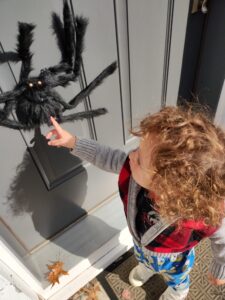


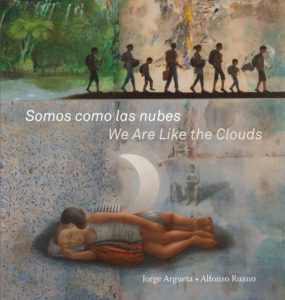
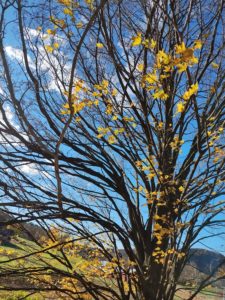 look at things differently. Even today, when I sat down to try to write Poem #9 and came up empty (so I started to write this blog post instead), I found myself intrigued by the leaves’ dance outside my window in that brilliant, but all-too-fleeting sun.
look at things differently. Even today, when I sat down to try to write Poem #9 and came up empty (so I started to write this blog post instead), I found myself intrigued by the leaves’ dance outside my window in that brilliant, but all-too-fleeting sun.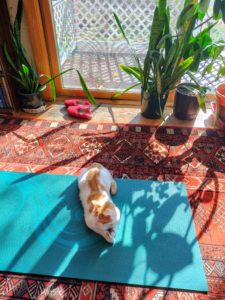
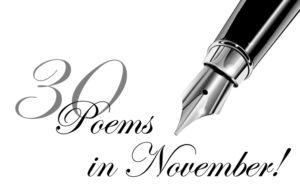


 Yet there’s a subtle beauty to the season, we just have to take a little more time to find it. Poem #29 touched on the varying shades of November: ochre, rust, mauve, sienna, even if at times the month feels like treading shadows. Today, a foggy rain is covering the farm. The autumn leaves, all raked up, are in the shed, eventually to be mixed into the compost to nurture spring’s new growth.
Yet there’s a subtle beauty to the season, we just have to take a little more time to find it. Poem #29 touched on the varying shades of November: ochre, rust, mauve, sienna, even if at times the month feels like treading shadows. Today, a foggy rain is covering the farm. The autumn leaves, all raked up, are in the shed, eventually to be mixed into the compost to nurture spring’s new growth. I knew I wasn’t supposed to stop, so I kept playing, making up something that was kind of like the piece, which was also cross-handed and in b minor. As I traveled an unmarked trail through the thicket of the keyboard, I felt the audience’s eyes like the eyes of wild animals in the dark, tracking me until I finally decided I’d had enough and landed on a final b minor chord. I stood up and bowed, waiting in an endless moment of stunned silence until a trickle of applause finally came like a faint drizzle, as I steeled myself to remember to walk, not run, off the stage.
I knew I wasn’t supposed to stop, so I kept playing, making up something that was kind of like the piece, which was also cross-handed and in b minor. As I traveled an unmarked trail through the thicket of the keyboard, I felt the audience’s eyes like the eyes of wild animals in the dark, tracking me until I finally decided I’d had enough and landed on a final b minor chord. I stood up and bowed, waiting in an endless moment of stunned silence until a trickle of applause finally came like a faint drizzle, as I steeled myself to remember to walk, not run, off the stage.